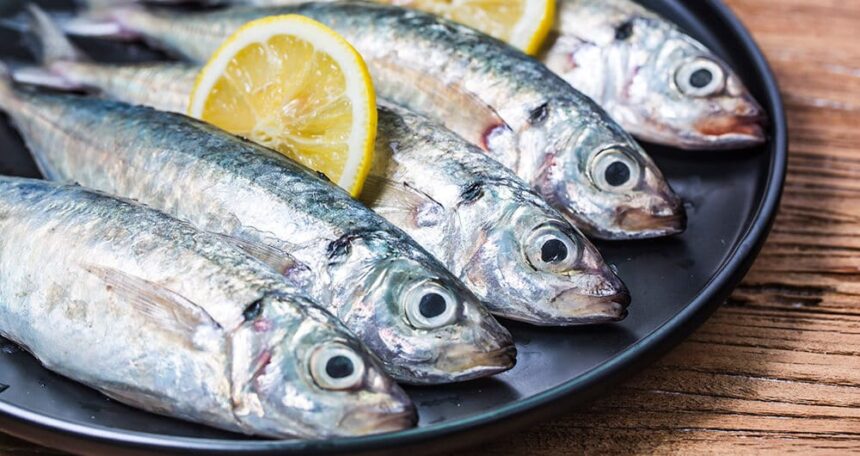The Spanish Agency for Consumer Affairs, Food Safety and Nutrition (AECOSAN) emphasizes the importance of including three to four servings of fish per week in a healthy diet, advice that is based on the exceptional nutritional value of fish and its crucial role in an balanced diet.
Known to be excellent sources of high-quality protein, omega-3 fatty acids, vitamins and minerals, fish offer multiple health benefits, including strengthening cardiovascular health and brain function. In this context, the coasts of Spain and the depths of the Atlantic and the Black Sea are home to a blue fish particularly notable for its high nutritional value, although it is often not given due attention in the usual Spanish diet.
Fish rich in potassium that fights cholesterol in Spain
The fish scientifically known as Scomber scombrus, more commonly called mackerel or mackerel, is an oily fish with a number of health benefits. These benefits include:
- High potassium content: mackerel contains more potassium than banana, a food traditionally recognized for its richness in this mineral. Potassium is vital for maintaining proper fluid balance in the body, regulating blood pressure, and ensuring proper functioning of the muscles and nervous system.
- Rich in omega-3s: Mackerel is an excellent source of omega-3 fatty acids, which are crucial for cardiovascular health. These fatty acids help reduce cholesterol and triglyceride levels in the blood, reduce the risk of cardiac arrhythmias, and may reduce blood pressure slightly.
- Good source of protein: It is a great source of high-quality protein, which is essential for building and repairing body tissues, as well as maintaining muscle mass.
- Contains essential vitamins: Mackerel is rich in several vitamins, including vitamin A, which is important for the health of the skin, eyesight and immune system; B vitamins, which help maintain a healthy metabolism; vitamin D, essential for bone health; and vitamin E, a powerful antioxidant.
- Minerals for bone health and more: offers minerals such as phosphorus and calcium, essential for maintaining healthy bones and teeth. Additionally, the high potassium content helps regulate blood pressure and improves muscle and nerve health.
- Brain health and disease prevention: The omega-3s present in mackerel are also beneficial for the brain, being able to improve cognitive function and reduce the risk of neurodegenerative diseases. They also help reduce inflammation in the body, which is beneficial for preventing and managing chronic inflammatory conditions.
- Beneficial for weight loss: Mackerel can be a good component in weight loss or maintenance diets due to its high protein and healthy fat content, which can help you feel full and satisfied.
- Skin Health: The nutrients in mackerel, including omega-3s and vitamin E, are good for the skin, helping to keep it hydrated and protected from environmental damage.
- Reduced risk of diabetes: Some studies suggest that omega-3 fatty acids may help reduce the risk of developing type 2 diabetes.
Incorporating mackerel into your regular diet can be an effective way to obtain these health benefits, especially if you are looking for a fish that is low in mercury and high in nutritional density.
How many servings can we take?
The inclusion of mackerel in the diet, due to its rich nutritional profile, is highly recommended, but as with any food, the quantity and frequency of consumption must be balanced. Generally, it is advised that adults incorporate between three and four servings of fish a week, alternating between different types, including oily fish such as mackerel. This recommendation seeks to ensure an adequate balance of nutrients and avoid excessive consumption of any particular type of fish.
A typical serving of mackerel for an adult is around 100 to 150 grams. For children, these portions should be smaller, adjusted to their specific nutritional requirements. Consuming mackerel within this range allows you to enjoy its benefits, such as omega-3 fatty acids, protein and potassium, without falling into excess.
It is important to note that although mackerel is not known to have high levels of mercury, as is the case with larger fish, it is prudent to vary the types of fish consumed. This variation not only minimizes the risk of heavy metal accumulation, but also enriches the diet with different nutritional profiles offered by various types of fish.
Mackerel should be part of a well-balanced diet, including a variety of other foods. This ensures that all the nutrients necessary for good health are obtained. Additionally, people with particular health conditions or special dietary needs should consult a health professional for specific advice on the appropriate amount of mackerel and other fish in their diet.
What fish should we avoid
The Organization of Consumers and Users (OCU) of Spain carried out an analysis in 2021 of more than 100 fishing products, which included fresh, frozen and canned fish. The results of this study provide valuable guidance on which fish to avoid or consume with caution, especially in relation to mercury content.
The study concluded that most of the fish and shellfish analyzed had low levels of this heavy metal. Species such as mussels, clams, octopus, squid, prawns, salmon and sole were among those showing the lowest concentrations of mercury.
However, particular concern focused on large, predatory fish species such as bluefin tuna, swordfish and various types of sharks, such as blue shark and mako shark. These fish tend to accumulate greater amounts of methylmercury, an organic form of the metal, due to their position at the top of the food chain. This phenomenon is due to bioaccumulation, where mercury becomes more concentrated as you go up the food chain, affecting humans who consume these fish.
The study also highlighted that aquaculture products generally contained less mercury compared to wild-caught fish. This difference can be attributed to the different environments and diets of farmed fish versus wild fish.
The OCU, like other previous studies such as the one carried out in the Valencian Community, reaffirms the importance of consuming fish in a balanced diet, given its richness in nutrients such as proteins of high biological value, vitamins A, D, B12, iodine and selenium. However, it emphasizes the need to vary the types of fish consumed and be cautious, especially in vulnerable groups such as pregnant women, lactating women or children under 10 years of age. The Spanish Agency for Food Safety and Nutrition (AESAN) advises limiting the consumption of fish with high concentrations of mercury in these groups.
Fish with lower levels of mercury, recommended for more frequent consumption, include species such as haddock, anchovy, cod, mackerel and sardine. In addition, herring is mentioned, which, although it is not one of the most popular in Spain, would be a healthy and safe choice. AESAN’s general recommendation is to consume between three and four weekly servings of fish, varying between fish and shellfish, to take advantage of its nutritional benefits while minimizing the risk of exposure to mercury.













